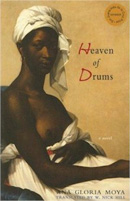

Curbstone Press, paperback, 9781931896252
Heaven of Drums is an ambitious little book which uses an interracial love triangle to build a narrative history of the independence of the author's native Argentina. Moya's novel looks behind the high ideals of the nation-builders to show the roles that racism and jealousy played in shaping her country's identity.
The story is set in the early 19th Century, during a turbulent time that saw South Americans fighting Spain, Britain and each other for their independence. Three very different Argentinians are thrown together by these wars. Manuel Belgrano is the general in charge of the Northern army; blond-haired, blue-eyed and Spanish educated, he is every inch the European transplanted to the New World. Gregorio Rivas is a rich mulatto landowner, as physically fit as Belgrano is sickly. The two have a longstanding emnity dating back to their schooldays together, when Belgrano flaunted his 'racial superiority' over Rivas. The third member of the triangle is María Kumbá, a sorceress and descendent of slaves. Kumbá and Rivas embark on a passionate affair, but her heart is with Belgrano, despite his disgust for her dark skin, which heightens Rivas' bitterness towards him. The rivalries among the three protagonists eventually begin to affect the progress of the war, and the identity of the nascent Argentina.
Heaven of Drums is successful enough that I admired its ambitions, if not always its execution. The story is told using short chapters divided among three separate narratives: one focusing on Rivas, one on the relationship between Kumbá and Belgrano, and one looking at Kumbá's life before the war. These three narratives are not given distinctive voices, apart from a weak attempt to emphasise Kumbá's lack of education by having her mispronounce one or two words in each chapter. In lieu of this, the separate narratives were, slightly bizarrely, given their own fonts. This may have made them distinctive on the page, but did nothing to help define the characters as individuals, which became a hindrance in a book that relies heavily on the subtleties of their relationships.
All that aside, however, it was never going to be an easy task to use a love triangle as the
basis for a narrative history of Argentina, and to do it all in less than 200 pages, but
Moya gives it an admirable go.The issues of race and identity are brought to the fore
without ever being over-emphasised, and issues that dog other narrative histories, such
as the characters engaging in inexplicable behaviour just to mirror the course of their
country's history, are absent here. Heaven of Drums is good historical romance with
subtle allegorical layering, and a challenging alternative look at the forces that can
shape the birth of a nation.